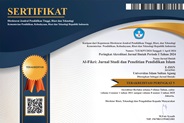IMPLEMENTATION OF AL-GHAZALI’S ISLAMIC EDUCATION PHILOSOPHY IN THE MODERN ERA
Abstract
ABSTRACT
Philosophy and education are two things that cannot be separated. Philosophy is the basic foundation or direction for achieving the implementation and goals of education. Education aims to shape human beings in achieving complete humanity. Even Islam offers a concept of human beings, namely the prototype of humans who carry out their duties as khalifatullah fil ardh; humans who not only have intellectual intelligence (IQ), but also spiritual (SQ) and emotional intelligence (EQ). The problems that arise, complaints about the increasingly widespread individualist, materialist, and pragmatic nature of the community are allegedly because the modern education system ignores the basics of the value of education and only pursues material benefits. This article offers a solution to answer the challenges of education in the modern era which refers to the philosophical value of education. Especially the concept of the philosophy of Islamic education taught by al-Ghazali. In his education philosophy, al-Ghazali did not recognize the separation between religious education and general education without linking of them. There is no aqliyah term without including syar'iyyah. Cognitive aspects are not developed without involving affective and psychomotor aspects at once. Because faith, knowledge, and charity always go side by side.
Â
Keywords: Philosophy, al-Ghazali, Education, Modern Era, Islamic Education
Full Text:
PDFReferences
BIBLIOGRAPHY
Ali, Yunasril. 1991. Perkembangan Pemikiran Falsafi dalam Islam. Jakarta: Bumi Aksara.
Alavi Hamid reza. 2007. Alâ€GhazÄli on moral education. Journal of Moral Education. Vol 36.
Ibnu Rusn, Abidin. 1998. Pemikiran Al-Ghazali Tentang Pendidikan. Yogyakarta: Pustaka Pelajar.
Gandhi, Teguh Wangsa HW. 2017. Filsafat Pendidikan: Mazhab-Mazhab Filsafat Pendidikan. Yogyakarta: Ar Ruz Media.
Hadi, Machmoed. 2000. Telaah Filsafati terhadap konsep pendidikan Al Ghazali. Thesis. Yogyakarta. UGM.
Iqbal, Abu Muhammad. 2013. Konsep Pemikiran Al-Ghazali tentang Pendidikan. Jawa timur: Jaya Star Nine.
Imam An-Nawawi. Matan Hadits Arba’in. Diterjemahkan oleh: Tim Pustaka Ibnu Umar. Edisi Revisi. Pustaka Ibnu Umar
Langgulung, Hasan. 1989. Manusia dan Pendidikan: Suatu Analisa Psikologi, Filsafat dan Pendidikan. Cet. II. Jakarta: Pustaka Al Husna.
Ma’arif, Ahmad Syafi’i. 1993. Peta Bumi Intelektualisme Islam di Indonesia. Bandung: Mizan.
Madjidi, Busyairi. 1997. Konsep Kependidikan Para Filosof Muslim. Yogyakarta: Al Amin Press.
Mahyuddin Barni, Diny Mahdany. 2017. Al GhazÄli’s Thoughts on Islamic Education Curriculum. Dinamika Ilmu: Journal of Education. Vol 17.
Nasution, Muhammad Yasir. 1988. Manusia Menurut Al-Ghazali. Jakarta: CV Rajawali.
Sulaiman, Fathiyah Hasan. 1986. Sistim Pendidikan Versi Al-Ghazaly. Bandung: Al-Ma’arif.
Syahridlo dan Sutarman (ed.). 2011. Filsafat Pendidikan Islam. Yogyakarta: Kopertais Wilayah III DIY UIN Sunan Kalijaga.
Syafe’ie, Imam. 1992. Konsep Guru Menurut Al-Ghazali: Pendekatan Filosofis Pedagogis. Yogyakarta: Duta Pustaka.
Tim Dosen Fakultas Tarbiyah UIN Maulana Malik Ibrahim Malang. 2009. Pendidikan Islam: Dari Paradigma Klasik Hingga Kontemporer. Malang: UIN-Malang Press.
Qardhawi, Yusuf. 1996. Al-Ghazali Antara Pro dan Kontra. Diterjemahkan oleh: Abrori. Cet. 3. Surabaya: Pustaka Progresif.
______________. 1998. Al-Qur’an Berbicara tentang Akal dan Ilmu pengetahuan. Diterjemahkan oleh: Abdul Hayyie al-Kattani. Jakarta: Gema Insani Press
Wartini, Atik. 2015. Education Character in View of Al-Ghazali And Its Relevance with the Education Character in Indonesia. Ta’dib: Journal of Islamic Education. Vol 20 No 2.
Zainuddin. 1991. Seluk-Beluk Pendidikan dari Al-Ghazali. Jakarta: Bumi Aksara
Zar, Sirajuddin. 2012. Filsafat Islam: Filosof dan Filsafatnya. Cet. 5. Jakarta: Rajawali Press.
DOI: https://dx.doi.org/10.30659/jspi.v2i1.4012
Refbacks
- There are currently no refbacks.
Al-Fikri is published by the Department of Islamic Religious Education, Faculty of Islamic Studies, Universitas Islam Sultan Agung, Semarang, Indonesia.

This work is licensed under a Creative Commons Attribution 4.0 International License








